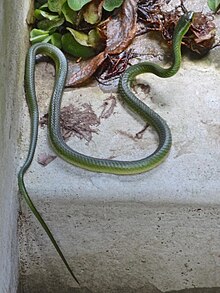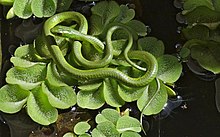| Philothamnus battersbyi | |
|---|---|

| |
| adult | |

| |
| juvenile | |
| Conservation status | |
 Least Concern (IUCN 3.1) | |
| Scientific classification | |
| Domain: | Eukaryota |
| Kingdom: | Animalia |
| Phylum: | Chordata |
| Class: | Reptilia |
| Order: | Squamata |
| Suborder: | Serpentes |
| Family: | Colubridae |
| Genus: | Philothamnus |
| Species: | P. battersbyi |
| Binomial name | |
| Philothamnus battersbyi Loveridge, 1951 | |
| Synonyms | |
| |
Philothamnus battersbyi, also known commonly as Battersby's green snake, is a species of snake in the family Colubridae. The species is native to northeastern Africa.
Etymology
The specific name, battersbyi, is in honor of British herpetologist James Clarence Battersby (1901–1993).
Geographic range
P. battersbyi is found in Ethiopia, Kenya, Somalia, Sudan, Tanzania, and Uganda.
Habitat
P. battersbyi is found in a variety of natural habitats close to water, including forest, savanna, grassland, and freshwater wetlands, at altitudes from sea level to 2,600 m (8,500 ft). It has also been found in polluted streams in major cities.
Description
The holotype of P. battersbyi, an adult female, has a snout-to-vent length (SVL) of 76.2 cm (30.0 in) and a tail length of 28.3 centimetres (11.1 in).
Behavior
P. battersbyi is arboreal and diurnal.
Diet
P. battersbyi preys upon amphibians, which may include caecilians, frogs, and toads.
Reproduction
P. battersbyi is oviparous. Clutch size is 3–11 eggs. Some communal nesting has been observed, with as many as 40 adult females laying over 100 eggs together in one nest.
References
- ^ Howell K, Msuya CA, Ngalason W (2021). "Philothamnus battersbyi ". The IUCN Red List of Threatened Species 2021: https://dx.doi.org/10.2305/IUCN.UK.2021-2.RLTS.T20878682A20878687.en. Accessed on 29 December 2022.
- ^ Philothamnus battersbyi at the Reptarium.cz Reptile Database. Accessed 2020-06-06.
- Beolens, Bo; Watkins, Michael; Grayson, Michael (2011). The Eponym Dictionary of Reptiles. Baltimore: Johns Hopkins University Press. xiii + 296 pp. ISBN 978-1-4214-0135-5. (Philothamnus battersbyi, p. 19).
- Loveridge (1951).
Further reading
- Chippaux J-P, Jackson K (1951). Snakes of Central and Western Africa. Baltimore: Johns Hopkins University Press. 448 pp. ISBN 978-1421427195.
- Lanza B (1990). "Amphibians and reptiles of the Somali Democratic Republic: check list and biogeography". Biogeographia 14: 407–465. (Philothamnus battersbyi, p. 439).
- Loveridge A (1951). "On Reptiles and Amphibians from Tanganyika Territory Collected by C. J. P. Ionides". Bulletin of the Museum of Comparative Zoölogy at Harvard College 106 (4): 175–204. (Philothamnus irregularis battersbyi, new subspecies, pp. 190–191).
- Spawls S, Howell K, Hinkel H, Menegon M (2018). Field Guide to East African Reptiles, Second Edition. London: Bloomsbury Natural History. 624 pp. ISBN 978-1472935618. (Philothamnus battersbyi, p. 485).
| Taxon identifiers | |
|---|---|
| Philothamnus battersbyi | |
This snake article is a stub. You can help Misplaced Pages by expanding it. |